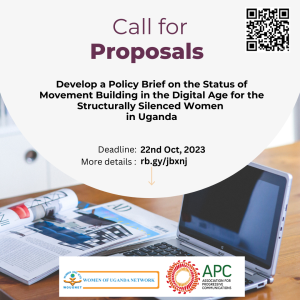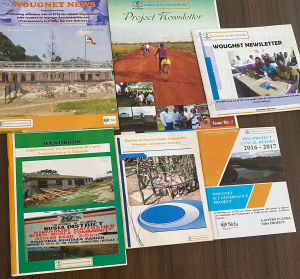Women of Uganda Network (WOUGNET)’s X community witnessed a dynamic Tweet Chat on 27th September 2023 where women human rights defenders, feminists, gender activists, journalists and other human rights defenders convened online to discuss the crucial issue: “Gender Justice is Under Attack: Countering Online Backlash in the Civic Space.”
The panelists including Ruth Nagudi from Media Focus on Africa, Carol Mukisa from Warm Hearts Foundation and Lorna Nagawa from Women’s Probono Initiative led the conversation that tackled various manifestations of online gender backlash, challenges faced by feminists in the digital spaces, repressive and oppressive legal frameworks, the future of online feminist organizing online, and the essential tools for female activists for successful online campaigns.
Understanding of online gender backlash
Backlash refers to the resistance that comes from individuals and systems and systems that aim directly or indirectly to sustain a structure that serves those in power. The urge to create an equal online environment and end online gender-based violence (OGBV) has intensified backlash to exist both in online and offline spaces. Participants shared their different understanding of the term online gender backlash;
“Backlash can mean adversity, hostility, and resentment reactions to gender equality discourses and practices on the internet,” a blogger noted. (Tweet)
“ Targeted harassment and it’s done through technology,” a Women Human Rights Defender highlighted. ( Tweet)
More perspectives on the understanding of online gender backlash can be accessible here: https://twitter.com/wougnet/status/1706987100195766682

The challenges feminists face while using digital platforms for organizing online
Women Human Rights Defenders, feminists, journalists, and other Human Rights Defenders utilizing digital platforms often face challenges online in different forms i.e. verbal, online, as well as physical or sexual abuse. These can include threats, trolling, and doxxing, among others.
They also deal with digital divides that limit access to technology and digital platforms. Moreover, the burden of dealing with gender-based discrimination both online and offline can be emotionally challenging. According to a Human Rights Defender during the Tweet chat,“ The reality of internet surveillance and control over our lives as women is impossible to escape.”
A feminist during the chat added that “Feminism activists are prone to various challenges influenced by the predominant gender stereotypes where women are not appreciated as influencers of change in their society.”
More perspectives: https://twitter.com/wougnet/status/1706989573111152928

The strategies for countering online backlash in civic spaces
Therefore, countering online backlash requires various long-term strategies. Some of these strategies may include building strong support networks, educating structurally silenced women on digital security and safety, and amplifying positive content, among others. It is therefore important to engage with allies, report harassment, and where necessary, take legal actions against the perpetrators.
Legal Officer from Women’s Probono Initiative said that “When it comes to online backlash, we need more than just the available legislations. We need strategized activism measures to increase awareness of the merits of online activism.”
More replies on perspectives about strategies for countering online backlash in the civic spaces: https://twitter.com/wougnet/status/1706992233411399906

Success stories or examples of impactful online feminist campaigns in Uganda
Several impactful campaigns have emerged in Uganda in regard to addressing issues like Online Gender-Based Violence and female political participation. These campaigns have amplified the voices of survivors and the advocates for change. One of the most popular campaigns is the #MeToo campaign which empowers young women and girls to share and publicize their experiences of sexual abuse and sexual harassment.
However, some of the global feminist campaigns such as #TimesUp, #NiUnaMenos #HeForShe #TheyCalledHer #ISpeakUpNow, and other movements continue to continue to build because social media is giving structurally silenced women a space to speak up and be heard. Read more about the global feminist campaigns here: https://www.unwomen.org/en/news/stories/2018/6/compilation-social-media-day
More about successful stories and campaigns in Uganda: https://twitter.com/wougnet/status/1706994608809353561

Legal Frameworks that hinder online feminist organizing in Uganda
Uganda faces legal challenges such as unclear and unrealistic laws such as the Computer Misuse Act 2022, which are most times used to suppress and silence feminists, WHRDs, journalists, and other human rights defenders. These laws greatly affect Freedom of Expression, Speech, and activism (online and offline).
A women’s rights activist highlighted that “Activists face a lot of harassment and continue to be victimized by the law that should protect them.”
Examples of suppressive laws in Uganda: https://twitter.com/wougnet/status/1706997171625615539

The Future of online feminist organizing in Uganda
Despite all the challenges, the future holds great potential for feminist organizing online in Uganda. As digital access and literacy increase among women and girls, more women are joining and will join the movement. With intersectional approaches playing a significant role in advocacy, and coalitions with other social justice movements, there will be a collective voice for change.
As stated by a media personnel, “ The future is bright for online feminist organizing online in Uganda. However, it lies in establishing meaningful alliances, and massive dissemination of messages that promote positive attitudes and behavioral changes towards advancing gender justice online.”
More perspectives on the opportunities and the future of online feminist organizing in Uganda: https://twitter.com/wougnet/status/1706999650408948016

The tools that are useful for feminist activists in Uganda to enhance their online organizing efforts
Feminists and activists can employ various tools, including encrypted messaging apps like Signal for secure communications, use social media platforms for awareness campaigns, and secure Virtual Private Networks (VPN0 such as Proxy VPN, Thunder VPN, Psiphon VPN, and Secure VPN to protect themselves from online threats and harassment.
Participants shared some tools such as social media platforms including Whatsapp communities, Podcasts, Firewalls, Zoom, and Signal, that are useful for feminist activists in Uganda to enhance their online organizing efforts.

The Tweet Chat had participants from different institutions such as WHRDs, journalists, HRDs, lawyers, and activists which led to an engaging conversation full of learning and gaining knowledge on the issue of online gender backlash. The discussion highlighted the urgency of addressing online gender backlash and the importance of amplifying feminist voices to counter online gender backlash in Uganda. Hence, it is imperative to ensure that online spaces are inclusive and open, and provide safety and security for all individuals, irrespective of their gender identity, to foster a truly equitable online environment.
Written by;
Irene Marunga Katushabe Communications Associate






